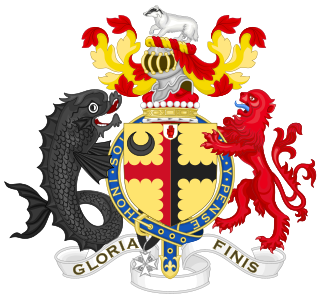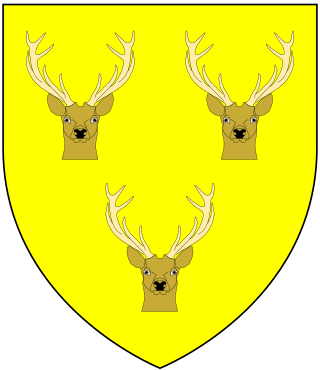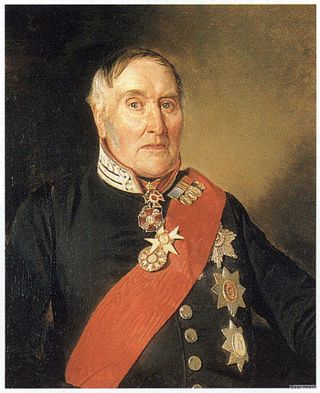
The Wylie Baronetcy, of St Petersburg, was a title in the Baronetage of the United Kingdom. It was created on 2 July 1814 for James Wylie, private physician to three successive Tsars of Russia. The title became extinct upon his death in 1854.

The Wylie Baronetcy, of St Petersburg, was a title in the Baronetage of the United Kingdom. It was created on 2 July 1814 for James Wylie, private physician to three successive Tsars of Russia. The title became extinct upon his death in 1854.

Marquess of Linlithgow, in the County of Linlithgow or West Lothian, is a title in the Peerage of the United Kingdom. It was created on 23 October 1902 for John Hope, 7th Earl of Hopetoun. The current holder of the title is Adrian Hope.

Earl of Southesk is a title in the Peerage of Scotland. It was created in 1633 for Sir David Carnegie, an Extraordinary Lord of Session. He had already been created Lord Carnegie of Kinnaird in 1616 and was made Lord Carnegie, of Kinnaird and Leuchars, at the same time he was given the earldom. These titles are also in the Peerage of Scotland. The earldom is named after the River South Esk in Angus. Carnegie's younger brother John Carnegie was given the corresponding title: earl of Northesk. The earl of Southesk also holds the Scottish feudal title of Baron of Kinnaird and is a baronet in the Baronetage of Nova Scotia. Kinnaird Castle, Brechin, has been the home of the earls of Southesk for several hundred years.

Earl Waldegrave is a title in the Peerage of Great Britain. It was created in 1729 for James Waldegrave, 2nd Baron Waldegrave.

Earl of Rosse is a title that has been created twice in the Peerage of Ireland, both times for the Parsons family. "Rosse" refers to New Ross in County Wexford.

Earl of Iddesleigh, in the County of Devon, is a title in the Peerage of the United Kingdom. It was created in 1885 for the Conservative politician Sir Stafford Northcote, 8th Baronet, of Pynes in the parish of Upton Pyne near Exeter in Devon and lord of the manor of Iddesleigh, 28 miles north-west of Pynes. He served as President of the Board of Trade, Secretary of State for India, Chancellor of the Exchequer, First Lord of the Treasury and Foreign Secretary and was Joint Leader of the Conservative Party from 1881 to 1885. Northcote was made Viscount St Cyres, of Newton Saint Cyres in the County of Devon, at the same time he was given the earldom. This title is also in the Peerage of the United Kingdom.

Earl St Aldwyn, of Coln St Aldwyn in the County of Gloucester, is a title in the Peerage of the United Kingdom. It was created in 1915 for the prominent Conservative politician Michael Hicks Beach, 1st Viscount St Aldwyn, known from 1854 to 1907 as Sir Michael Hicks Beach, 9th Baronet, of Beverston. He was Chancellor of the Exchequer from 1885 to 1886 and again from 1895 to 1902. Hicks Beach had already been created Viscount St Aldwyn, of Coln St Aldwyn in the County of Gloucester, in 1906, and was made Viscount Quenington, of Quenington in the County of Gloucester, at the same time he was given the earldom. Both titles are in the Peerage of the United Kingdom. He was succeeded by his grandson, the second Earl, the son of Michael Hicks Beach, Viscount Quenington, Member of Parliament for Tewkesbury, who was killed in action in 1916. Lord St Aldwyn was also a Conservative politician and was Captain of the Honourable Corps of Gentlemen-at-Arms between 1958 and 1964 and 1970 and 1974. As of 2018 the titles are held by his eldest son, the third Earl, who succeeded in 1992.

Viscount Brookeborough, of Colebrooke in the County of Fermanagh, is a title in the Peerage of the United Kingdom. It was created in 1952 for the Ulster Unionist politician and Prime Minister of Northern Ireland, Captain The Rt. Hon. Sir Basil Brooke, 5th Bt., P.C. (N.I.), M.P.
Baron Mostyn, of Mostyn in the County of Flint, is a title in the Peerage of the United Kingdom. It was created in 1831 for Sir Edward Lloyd, 2nd Baronet, who had earlier represented Flint Boroughs and Beaumaris in the House of Commons. His son, the second Baron, sat as a Member of Parliament for Flintshire and Lichfield and served as Lord Lieutenant of Merionethshire.

The Hanham Baronetcy, of Wimborne in the County of Dorset, is a title in the Baronetage of England. It was created on 24 May 1667 for William Hanham, a member of a Somerset family.
The Ashburnham Baronetcy, of Broomham in the County of Sussex, is a title in the Baronetage of England. It was created on 15 May 1661 for Denny Ashburnham, Member of Parliament for Hastings. He was the grandson of Adam Ashburnham, Member of Parliament for Winchelsea in 1592, who was the son of Laurence Ashburnham, and a descendant of Richard Ashburnham of Broomham, second son of Thomas Ashburnham, whose eldest son John was the ancestor of the Earls of Ashburnham. He was succeeded by his elder son, William, the second Baronet. He represented Hastings and Seaford in the House of Commons. He died childless in 1755 and was succeeded by his younger brother, Charles, the third Baronet. His son, William, the fourth Baronet, was Bishop of Chichester. On his death the title passed to his son, the fifth Baronet. He sat as Member of Parliament for Hastings.

There have been three baronetcies created for members of the Ingilby/Ingleby family, one in the Baronetage of England, one in the Baronetage of Great Britain and one in the Baronetage of the United Kingdom. The latter title is extant while the other two creations are extinct.
There have been two baronetcies created for persons with the surname Ross, both in the Baronetage of the United Kingdom. One creation is extinct while one is still extant.
The Mallinson Baronetcy, of Walthamstow in the County of Essex, is a title in the Baronetage of the United Kingdom. It was created on 6 July 1935 for William Mallinson. He was a Justice of the Peace for Essex. The second Baronet was a Deputy Lieutenant of Essex.
Six baronetcies have been held by the Grant family.
There have been four baronetcies created for persons with the surname Hay, all in the Baronetage of Nova Scotia. Two creations are extinct, one dormant and one extant. A fifth baronetcy in the Jacobite Peerage, although theoretically extant, is not recognised by the Lyon Office.

The Dalrymple, later Dalrymple-Hamilton, later Hamilton-Dalrymple Baronetcy, of North Berwick in the County of Haddington, is a title in the Baronetage of Nova Scotia. It was created on 29 April 1697 for the Hon. Hew Dalrymple, Lord President of the Court of Session under the judicial title of Lord North Berwick from 1698 to 1737. He was the third son of James Dalrymple, 1st Viscount of Stair, and the brother of John Dalrymple, 1st Earl of Stair, Sir James Dalrymple, 1st Baronet, of Cranstoun, and Sir David Dalrymple, 1st Baronet, of Hailes. The second Baronet sat as Member of Parliament for Haddington and Haddingtonshire. The third Baronet represented Haddingtonshire in the House of Commons. The fourth Baronet was Member of Parliament for Haddingtonshire, Ayrshire and Haddington. He assumed the additional surname of Hamilton after that of Dalrymple. The fifth Baronet sat as Member of Parliament for Haddington. The eighth Baronet assumed the surname of Hamilton before that of Dalrymple. The tenth Baronet was Lord-Lieutenant of East Lothian from 1987 to 2001.
There have been two Baronetcies created for persons with the surname Strachan, both in the Baronetage of Nova Scotia. Both are currently either extinct or dormant.

The Colleton Baronetcy, of London, was a title in the Baronetage of England. It was created on 18 February 1661 for John Colleton, in reward for his support for the Royalist cause during the Civil War. The second Baronet represented Bossiney in Parliament. The title became extinct on the death of the ninth Baronet in 1938.

Sir James Wylie, 1st Baronet, was a Scottish physician who served as a battlefield surgeon and as a court physician in the Russian Empire from 1790 until his death in 1854, and as President of the Russian Imperial Medical and Surgical Academy from 1808 to 1838. He is considered one of the organizers of military medicine in Russia by some by whom the role of the indigenous Russian Nikolay Ivanovich Pirogov as the "father of combat medicine" may appear to be less valued.
James Wylie may refer to: